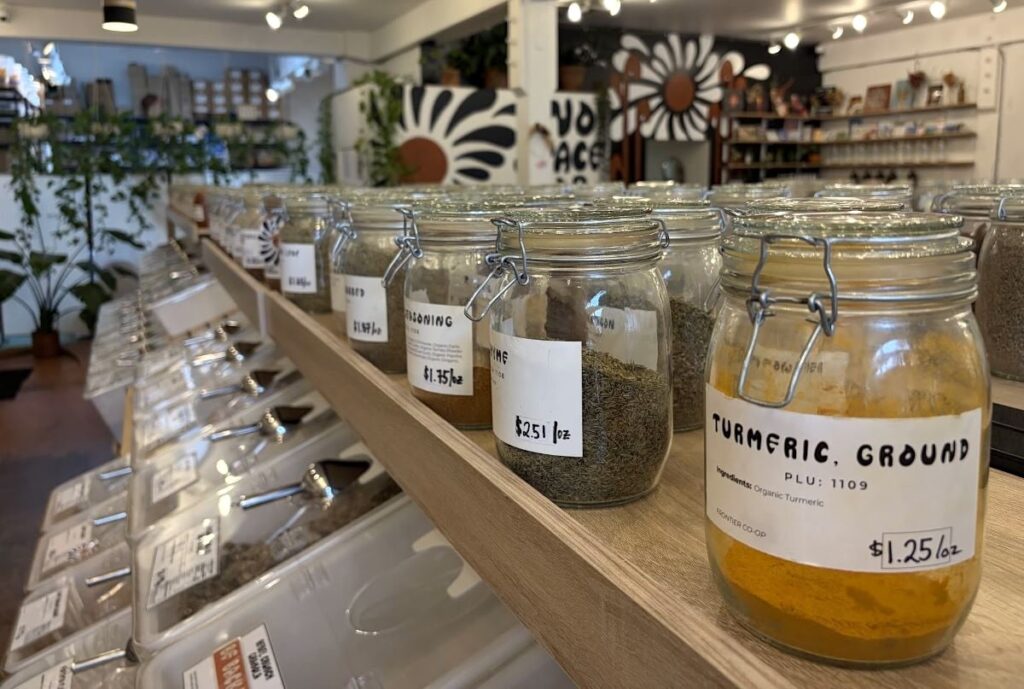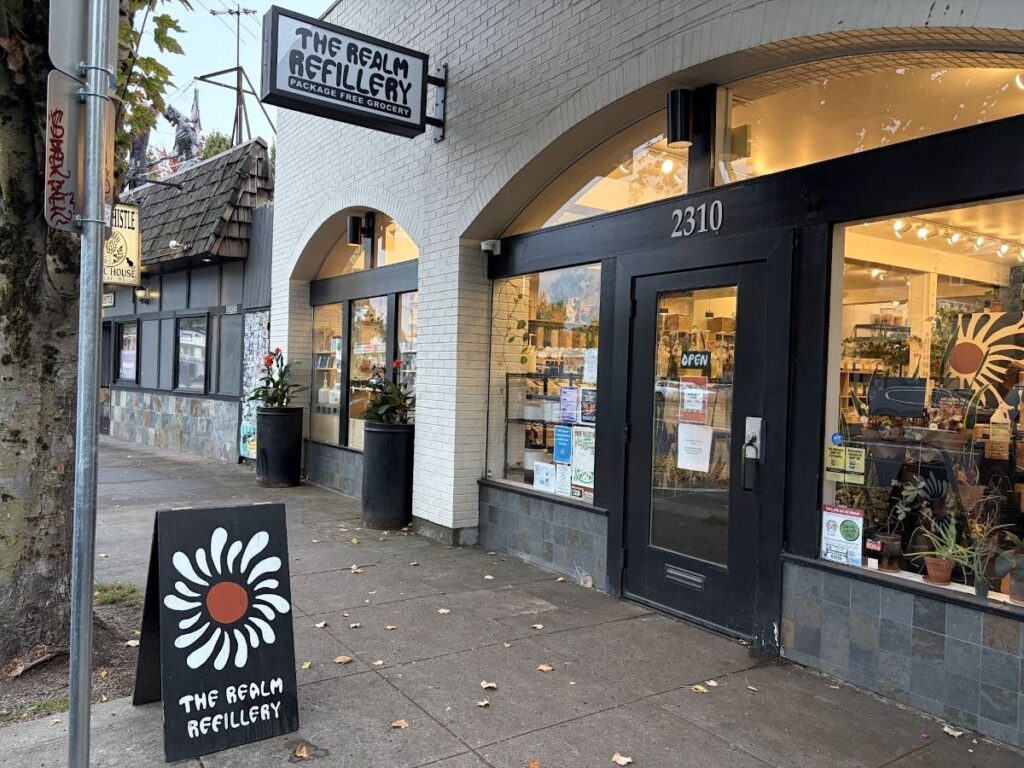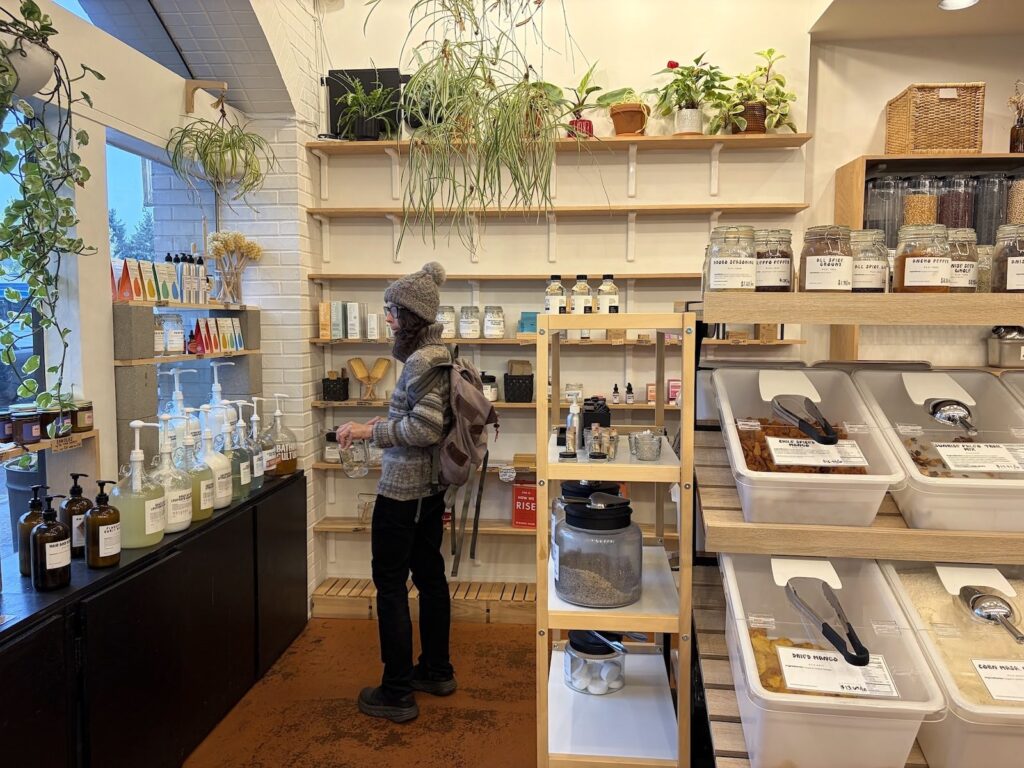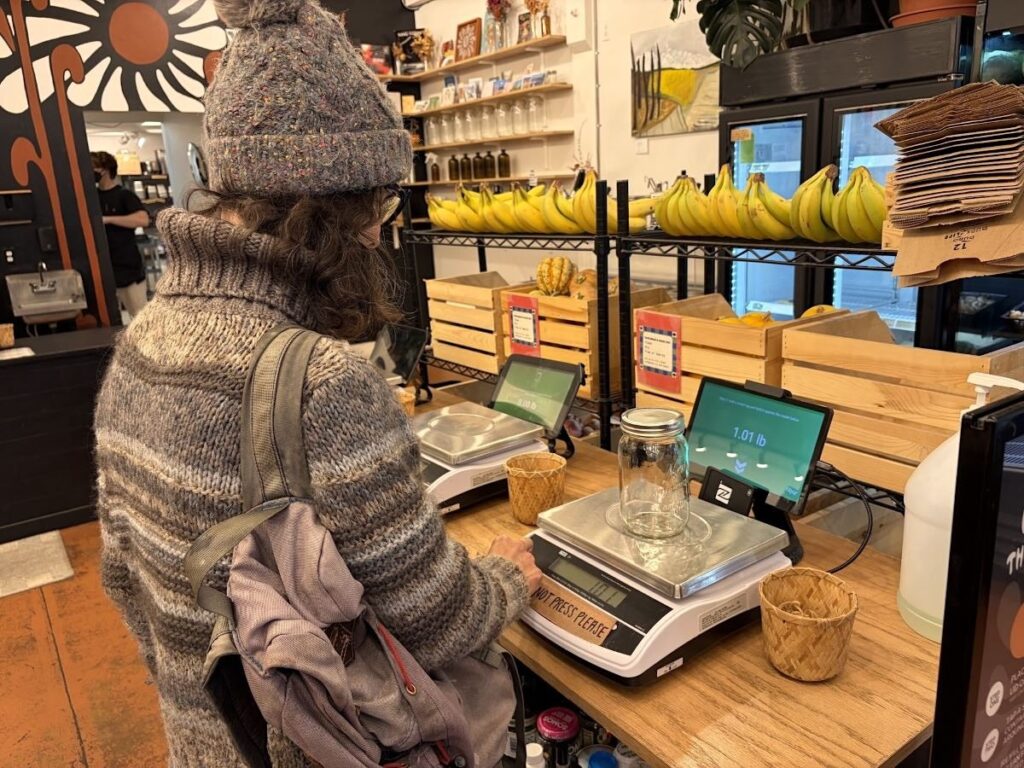“Have I told you my idea?”
Brittany Snipes was curled up on the couch with her now husband, Ryan Knowles, sharing a joint. The two had started dating just a few months prior, and they’d been inseparable since meeting.
“What idea?” Knowles asked. Snipes couldn’t believe she hadn’t told him about this vision inspired by a recent trip to Italy. Knowles recalls the scene on the couch as “something out of That ’70s Show.” Snipes kept saying “My idea!” and he’d ask, “What idea?!” The two went back and forth between giggles until she finally told him: she wanted to open a waste-free grocery store. And she was very serious about making this idea a reality.
“He was like, ‘That’s crazy,’” says Snipes. “It took him a minute, but then I started Googling zero-waste stores in Australia and Germany and showed him what it would look like.” They agreed this kind of thing could do really well in a city like Portland.
The dream store would stock bulk, local products and customers could fill their own reusable containers with only what they needed. Everything would be ethically sourced from local vendors with sustainable practices. It would be a shopping experience free from the ecological harm done by traditional grocery stores with their plastic-wrapped produce and countless brands of processed snacks delivered by long lines of carbon-spewing trucks.
By May 2022, nine months after Snipes shared her vision, she and Knowles were signing the lease for the Realm Refillery in the Sullivan’s Gulch neighbourhood of Portland, Oregon — which claims to be the first package-free grocery store in the city. While other local refill stores offer household and personal products, and some dry goods, Realm is the first to offer all that plus perishable food items.
Customers can bring their own jars or help themselves to donated ones, which they fill from an array of options. Realm has bins of legumes, pastas, flours, sugars, vegan proteins, spices, coffee and tea. There are metal vats with taps that dispense oils, vinegars, and sauces, and household cleaning products are stored in cardboard dispensers. There’s a cold bar, home to tofu, salsas, and spreads. In the fridges, customers find a well-curated selection of in-season produce, each labelled with the local farm it came from.
“We bring in some wild, foraged ingredients — stuff you definitely don’t see in a typical grocery store,” says Knowles.
Near the register, there’s a glass case showcasing community resources and local fundraisers, including a bunch of QR codes for donating to families in Gaza. Taped to the case are laminated daisies reading “$10.”
This business model prompts a lot of questions, like how to weigh the bulk items and how to sustain a customer base of people willing to forgo the convenience of plastic. But on the glass case, it’s clear that the owners want to make this place accessible to as many people as possible. “Need a discount?” reads a sign. “Take a daisy from our cabinet to the counter for $10 off your purchase. No questions asked.”
A Blast From the Past
Prior to the invention of plastic in 1907 and the development of chain stores, grocery shopping looked different: the general store was for dry goods only, the butcher for meat, and you went to a market for local produce. It wasn’t all in one place.
Refilleries are a return to a model that encourages more intentional and frequent shopping. The hope is that people take what they need and come back frequently. This is a big departure from today’s traditional grocery store model, where buying more is encouraged.
The modern grocery store offers an abundance of products from all over the world, and shoppers are incentivized to stock up, especially at big-box stores like Costco. People then buy more than they need, both to save money and to reduce trips. But that overshopping inevitably leads to food (and its packaging) getting tossed, along with so many other types of waste.
Snipes’s first job was at a restaurant in Myrtle Beach, South Carolina, and she remembers, at just fourteen, being troubled by thoughtless waste. “All of our plates and cups were single use. We’d fill up an entire dumpster in less than a week.”

Katie Conlon, plastic pollution researcher and director of Ecoseva Institute, says the whole system is designed to hide the reality of our everyday waste.
“The amount we throw away every day is staggering,” Conlon says. “People just throw it in a bin and forget about it. But it’s going somewhere.”
That somewhere is often home to people of colour or otherwise disadvantaged communities, as waste management facilities and landfills have historically been placed in low-income areas.
Conlon says everyone should visit their local dump, to better understand the enormity of our waste problem. “Watch the trucks come minute after minute. You can’t unsee that.”
Newsletter Sign-up
Sign up for our newsletter to receive inspirational stories about people working to build a bioregional movement across Salmon Nation.
One problem that is very visible: plastic. Many products at traditional grocery stores are wrapped in plastic to protect them during transportation and delivery and to keep them fresh longer. And yet, 30 to 40 per cent of the U.S. food supply goes to waste, according to the U.S. Department of Agriculture.
A recent survey in Canada by Environmental Defence found that plastic usage is increasing in grocery stores: about 70 per cent of produce comes in some kind of plastic container. In the United States, only about five per centof plastic is recycled. Of the 40 million tonnes of plastic waste managed in 2019, 86 per cent wound up in a landfill. Canada is doing a little better with about nine per cent of plastics recycled, but its government still recently called on supermarkets to cut their plastic use.
Reducing waste for big chain stores requires collaboration from production to retail to consumer to waste management. Even the best intentions and commitments from brands can fall through the cracks of the product life cycle. Justin Carven, a waste reduction and circular economy consultant based in Portland, sees first-hand how every aspect of the industry is siloed, preventing meaningful progress from happening on a large scale.
“You see companies spending a fortune for compostable packaging,” says Carven. “But if your customers aren’t sorting it properly, or you’re not setting up the right relationships with waste management companies, then it’s all still going to the landfill. And then it’s just greenwashing.”

Knowles says running the Realm Refillery has been more work than he and Snipes ever imagined. That’s partially because they need to know so much about everything they sell.
Small businesses like Realm, and similar package-free grocery stores, don’t have the impact of a chain store. But their size makes it a lot easier to look closely at the life cycle of everything that’s coming in and going out.
“We’re always reassessing products and new information,” says Knowles. “Is there a better version of something, or a better-sourced ingredient? We’re constantly adapting and evolving here.”
Small Business, Big Intention
Being plastic-free is only one aspect of the circular-economy business model embraced by the Realm Refillery and other package-free stores. A circular economy prioritizes sustainability over profit by reducing materials and then reusing, refurbishing, and redesigning to extend the life cycle of a product and keep it in use. Eventually, materials can be recycled or composted, returning to a system that hopefully feeds itself, rather than continuously extracting more.
For a circular economy to work, buyers have to know where their products are coming from. Both Snipes and Knowles have worked in the food service industry, meaning they had connections to vendors. They’re also regulars at the local farmers markets around Portland and had their own food truck selling vegan cheese, which they recently moved into a bricks-and-mortar vegan restaurant.
“We wanted those vendors to have a place where their products live, seven days a week, and also a place where we could get produce that was super local and hyper-seasonal,” says Knowles. “Now, we have a bin with their name on it.”

They also highlight minority business owners like Sao Noi Chili Oil, one prepackaged option in their small selection of jarred and canned goods. A little cardboard sign on the shelf reads, “Locally made! Loa + Women Owned!”
Carven points out that persuading bigger vendors to go package-free can be a hard sell, because brands rely on packaging to catch the consumer’s eye and build brand awareness. But that’s less of an issue at Realm, where the owners are personally reaching out to brands they know and love. Some of the goods they carry weren’t available package-free until they partnered with Realm. For example, Hot Mama Salsa sells their tortilla chips regionally in plastic bags. But for Realm, they deliver fresh tortilla chips weekly in bins that are returned and refilled.
On the other end of the product life cycle, when produce at Realm is just past its prime, employees pack it into jars to freeze as take-home smoothies. Or it goes in the compost. Any packaging used to deliver bulk items to the store is sent back to the producer to be reused.
Customers haven’t always been able to bring their own containers from home. Their ability to do so now is thanks to legislation Snipes and Knowles helped pass in 2023. When Realm first opened in May 2022, there was a ban on customer-supplied containers for takeout and bulk shopping across Oregon. This proved to be a major deterrent; new customers had to buy into Realm’s deposit system to take store-supplied containers home and bring them back. And providing the jars was a big addition to the store’s overhead. So Snipes and Knowles worked with a local Surfrider chapter to draft a bill that could change that — and it passed. Snipes says reducing that barrier to entry has made a huge difference for business, but there’s still been a learning curve for a lot of people.
Knowles says a beautiful part of that learning curve is the opportunity to talk to customers. Often when people come in for the first time, they have lots of questions about how things work. There are instructions at the entrance, but often employees jump in to help out. They explain the tare station, where customers place jars on the scale, then scan a smart tag that gets attached to the jar, indicating how much it weighs, which is then subtracted from the total weight once it’s filled.
Often, those instructions lead to longer conversations.
“The next thing you know,” says Knowles, “you’re chatting with someone for 20 minutes about all the small changes they can make to their lifestyle to better align with their ethics.”
Facing the Waste
It’s a system shift that has some demand. No-waste grocery stores have opened in rural and major urban cities from B.C. to California, including Vancouver, Powell River, and Los Angeles, which had its first refillery, Re_grocery, open two new locations in recent years.
Conlon says she’s excited to see more of these package-free grocery stores popping up in North America. Even though they might not have the power and reach of a big retailer, she says, they play an important role.
“Normal stores don’t have to educate on capitalism,” she says. “Implicit in this business model is an education model. You’re re-educating the community on the values around why this business model is important. And why it’s a viable asset for the community. I think it is really important to help spread the word about why this is a really important commercial shift.”
Knowles especially loves educating people on eating through the seasons in the Willamette Valley, famous for its rich soil and abundance of ecological diversity. He points out that all of the regional farmers and the crops they grow are part of our community, too.

That said, building a viable customer base has been challenging for Realm. Knowles and Snipes have watched similar businesses come and go; a refill shop in Long Beach, California, that was similar to Realm and served as inspiration for Knowles and Snipes recently closed.
“We’re always teetering,” says Snipes, about bringing in enough business to keep things moving. “But we’re fortunate that we can buy really small amounts.”
“We can’t compete with big chain grocery stores,” says Knowles. “So it takes a mindful community. Portland is a really special place where a concept like this can thrive.”
Knowles and Snipes both say that being very clear on their values has been key to their success. But Snipes points out that some amount of flexibility has been necessary to bring in a steady stream of repeat customers. For example, when they first opened, they carried only in-season products purchased locally. But they also want Realm to be a one-stop shop for grocery shopping, and certain staples can’t be found locally; bananas are a big one. So they did their research and found GROW, a women-led organic produce distribution company based out of San Francisco that partners with organic producers to ensure fair labor and sustainable practices. Now customers can get their bananas at Realm, alongside mostly local produce that’s delivered daily by bike.
Not all shoppers may be able to afford the cost or have the time to visit specialty, package-free stores like Realm on a regular basis. But those who can are helping to spread the idea of ethical consumption that doesn’t harm people or the environment. Realm’s existence — from their bricks-and-mortar store on a busy corner, to the conversations that continue when customers leave — has an inevitable ripple effect that reaches into surrounding communities.
“It’s bigger than grocery shopping,” says Conlon. “You’re part of a greater system, and creating systems of care is very important.”

